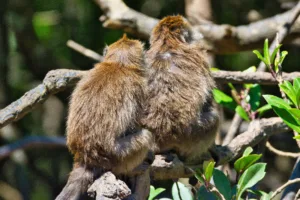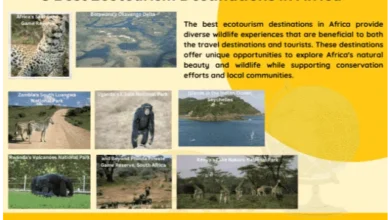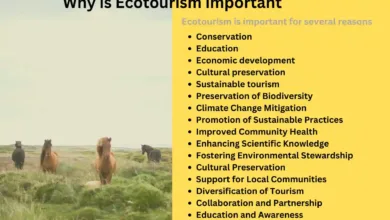
What are the Major Impacts of Ecotourism?
What is Ecotourism?
Ecotourism is a form of environmentally conscious travel where travelers discover delicate, pristine locations that are frequently maintained. Ecotourism is designed to function on a small scale with little impact on the environment. The impacts of ecotourism are both negative and positive.
Environmentally friendly facilities include locally sourced food, on-site waste management, and amenities that blend in with their environment. The number of travelers is limited to guarantee that there is no unnecessary environmental damage. Although this raises the expense of visits for travelers.
The basic principle of ecotourism is preservation, which allows new generations to visit locations that have remained comparatively unspoiled. Ecotourism is fast establishing a significant business for many underdeveloped nations. Bringing in overseas revenue while protecting several of the nation’s most vulnerable habitats.
Certain nations can do this by safeguarding their rainforests. Since ecotourists visit to see a country’s natural grandeur rather than the destruction caused by natural resources extractive businesses such as coal and oil. In this article, both the positive and negative impacts of ecotourism are examined.
Read more: A Beginner’s Guide to Adventure Tourism
What are the Positive Impacts of Ecotourism?
Interest, both regarding nature and interaction, is a component of ecotourism. Tourists are broadening their choices and locations, rather than heading to major tourist spots such as Japan, France, Greece, and Berlin.
Additional locations imply greater job prospects for native individuals in low-income regions and nations. Local residents serve as tourist guides, specialists, demonstrations, shopkeepers, and attendees to visitors.
The impact of ecotourism in increasing tourism translates to more revenue flowing straight back into the neighborhood, as well as a greater level of lifestyle. Social engagement and ecotourism enable individuals from all around the globe to visit underprivileged communities and help them recover by offering resources and support. In that case, a holiday may entail helping, constructing, or assisting in a poor neighborhood.
Ecotourism promotes ethnic awareness. Regions may increase their prosperity and enlighten a larger audience by embracing native culture accommodation, cuisine, heritage, and events. This is one of main positive impacts of ecotourism.
Furthermore, diverting attention aside from traditional tourism spots relieves strain on the local surroundings and habitats. Projects for repair and maintenance are funded with the money saved by easing ecological restrictions. Ecotourism allows individuals to enjoy a fresh interaction with wilderness while also learning something about ecological issues. Ecotourists may have a stronger appreciation for the environment after seeing it up close and personally. When it comes to the environment, the expression “What individuals are unaware of, they simply do not care about” is quite accurate. As even more individuals see nature up close and grow enthusiastic about maintaining it, ecotourism may contribute to greater scientific possibilities and improved administration approaches.
What are the Negative Impacts of Ecotourism?
As ecotourism grows, so does the demand to improve regions and make them increasingly accessible and luxurious. Expanding housing, companies, and facilities inside these towns and attractions harm and damage the environment. Visitors put more strain on native organisms by harming the natural ecosystem.
Very many individuals may enter a certain area, disturbing the species that reside there and destroying their homes. Ecotourists may collect objects for mementos in an unsustainable fashion, disturb animals and other species, step on plants, and compress the ground while traveling, which can occasionally result in the environment being “loved to death.”. These are some examples of the negative impacts of ecotourism.
Additionally, the increasing resource pressure among encroaching tourism activities and indigenous communities is also a negative impact of ecotourism. In their absence, such societies and settings adopt the qualities and attributes of past prominent destinations.
Indigenous traditions are altered in order to maintain visitors visiting, which contributes to asset and animal plunder, which is presently ruining attractions. Expansionism and urbanization are more prone to happen in regions next to frequented sites.
This can result in ecosystem disruption and extinction for animals that rely on broad areas of pristine territory. Sound, light degradation, roadway construction, and a variety of other operations can all cause environmental and animal disruptions. If the locals are not included onboard and operations are not controlled regionally, ecotourism will be troublesome for th
This may happen if an external ecotourism business tries to establish such operations without the approval and consent of the locals. This might result in disputes between ecotourism operators and native residents, which is clearly not a good consequence. Indigenous people must be fully involved in the creation, implementation, and management of whatever is built someplace.
Human-wildlife confrontations between visitors and the travel sector have risen. Human-animal conflict could rise when individuals intrude further on the environment (particularly if the motives are good). The wildlife enters nearby urban facilities in search of food, which harms the ecosystem. In urbanized locations, wildlife could also be more prone to be harmed by vehicles and humans.
Animals may get overly familiar with people. Wildlife that develops acclimated to mankind could be more susceptible to hunting or become reliant on individuals for sustenance. Human involvement in animal habitats may cause discomfort. For certain animals, the simple existence of humans can have a detrimental influence on breeding, migration, as well as other ecological activities.
What is the Importance of Ecotourism?
Ecotourism is conscientious traveling that contributes to environmental conservation and the well-being of residents via financial assistance. With the number of visitors increasing year after year, it has become more crucial than ever before to improve the positive and negative effects of ecotourism. Costa Rica, Iceland, Kenya, and the USA are among the world’s top most renowned tourist destinations. These nations are host to world-renowned environmental beauties and ought to be at the forefront of one’s checklist if one wants to explore in an environmentally sustainable manner.
Conclusion
The article above discussed both the positive and negative effects of ecotourism. The bottom point with ecotourism is that it’s going to constantly have an effect on the environment and native populations. Making ecotourism activities viable, careful administration, extensive technical ecological study and management, and self-sufficiency and participative engagement of indigenous peoples are essential.
It’s also vital to realize that, as prospective ecotourists, humans have to be ethical, accomplishing everything they can to make a good influence on the landscapes and people they visit. This necessitates taking into account all aspects of the everyday journey, particularly the ecological impact of whichever method of transportation humans choose to go from location to location.
You may like:
Environmental Benefits of Ecotourism






Thanks alot.
Thanks alot. I have published more new articles regarding to tourism, you can read them and enhance your knowledge.
Thanks alot. I have published more new articles regarding to tourism, you can read them and enhance your knowledge.
Thanks, new articles has been published regarding tourism. You can read and enhance your knowledge and you may share your friends and relatives.
Thank you for your nice compliment, further more new blogs has been published regarding tourism. You can read and enhance your knowledge and you may share your friends and relatives.
Thanks you, that the you like liked my blog and appreciate. I have regularly published new blogs on my website. You can visit to my website and read them. Further your comments are valuable and respectful for me. One again thanks.
Thank alot, you have visited to my website and read blog and nice compliment. One again thanks.
Secondly i have visited your website and you have built amazing website. Catagories you have made of different varities of shoes its amazing.
I am happy to see here that this blog has decreased you downsides. You can read more blogs and enhance your knowledge and enjoy. Thanks
Thanks for your compliment.
Thank you for your compliment.
Can you share me the four emails which you are getting receive. Till now no any visitor complain me except you. If you share me the emails i will rectify the issue because your comments are valuable for me. Thanks
Thank you for your nice compliment.
Thanks.
Thanks for your compliment.
Thank you read the blog and compliment.
First thanks to you that you come to my website and read the article and like it. I have published many new informative blogs in my website, you can read them and further share it to your relative and friends and they can enhance their knowledge and enjoy. Thanks
Thanks you read my blog and like it.
Thanks for your valuable comments, you read the blog and appraised. Recently i have publushed more informative and interested blogs. You may visit to my website and read them and further share to your friends. Once again thanks.
Thanks you read the blog and appreciated.
Thanks you and your office fellow workers who visited my blog and like it and appreciated me. Once again thanks all of you.
Thanks for your appreciation.
Thanks for you appreciation.
Thanks for your compliment and I happy to say that you have liked my blog and some of your issues are resolved due to read the blog. You may share it to more and more people. Once again thanks.
Hi, Thanks for your comments. You may share more and more ahead, so people can read and get benefit from this blog. Once again thanks.